#Tolkien themes
Text
Topics & Themes in Tolkien’s Legendarium
The Perilous Realm
“Stories that are actually concerned primarily with ‘fairies,’ that is with creatures that might also in modern English be called ‘elves,’ are relatively rare, and as a rule not very interesting. Most good ‘fairy-stories’ are about the adventures of men in the Perilous Realm or upon its shadowy marches.”
– J. R. R. Tolkien. On Fairy Stories.
Tolkien called it the Perilous Realm, Faery or Faërie, and for me these words represent one of the most fascinating theme in Tolkien’s Legendarium. It is both a narrative and a world-building element that can be found in all his major Middle-earth stories and is in a way essential for understanding Tolkien’s approach to his own created world.
Yet I feel it rarely gets talked about, so I want to briefly highlight what it is, how it functions in the narrative, and give a few examples from various stories. Unfortunately can’t go into a deep analysis because doing so would require me to write a book – which I would love to, but I don’t have the time or qualification). Quote sources and further reading recommendations are given at the end.
WANDERING INTO FAERY
“It is common in Fairy tales for the entrance to the fairy world to be presented as a journey underground, into a hill or mountain or the like. [...] My symbol is not the underground, whether necrological and Orphic or pseudo-scientific in jargon, but the Forest […].”
– J. R. R. Tolkien. “Smith of Wooton Major” essay.
The core of this theme is the mortal wanderer who comes to or crosses the borders of Faërie, the land of fairies or elves. This idea has been part of legends and myths for a long time, one of the most prominent examples probably being the island of Avalon in the Arthurian legend. Depending on the story, Faërie can occupy a different time and space than our own world, or share the same space or time “in different modes”. Getting into Faërie is not always possible and many things can stop someone from entering: it may be completely inaccessible, it may be hidden and people have to find it, or it may be accessible only to those who know the secret on how to enter it. Once you are there, it may be difficult to leave, or it may take some time. Being there could turn out to be dangerous, but it also doesn’t necessarily have to be. Tolkien wrote that “in it are pitfalls for the unwary and dungeons for the overbold”.
In The Lord of the Rings, there are many examples of such a realm, some barely noticeable and some very clear and detailed.
It starts subtle when Frodo, Sam and Pippin meet Gildor and his Elves near Woodhall. It is no specific realm that they enter, but just wandering with the Elves already lets the Hobbits experience something they are not used to. They have trouble finding words for it afterwards or remembering it clearly, with Tolkien describing it that for Pippin it felt like he was in a waking dream. The next example is then already more direct: the four Hobbits enter the Old Forest. This time it really is perilous for them, they get lost and cannot find a way out. Tolkien describes it as follows:
“They began to feel that all this country was unreal, and that they were stumbling through an ominous dream that led to no awakening.”
Frodo almost falls asleep near an enchanting river, Merry and Pippin almost die. Without the help of an unexpected inhabitant of this forest, they never would have gotten out.
Reaching Rivendell is another less clear example. Rivendell itself is easier accessible than the Old Forest and less perilous for the Hobbits. But reaching it also includes a river, a river that is under Elrond’s command and that rises “in anger when [Elrond] has great need to bar the Ford”. And within Rivendell, Frodo experiences another kind of “Faërian Drama” as Tolkien calls it: the stories and songs told in Rivendell hold him “in a spell”, and “the enchantment became more and more dreamlike” until in the end Frodo falls asleep once more. Bilbo comments that it’s difficult to stay awake “until you get used to it”.
The most prominent example is of course Lothlórien, a land of Elves that is rarely visited by mortal beings and where the flow of time is indeed different than that in the outside world. It’s also well defended against wanderers, and both in the world and the narrative the fellowship has to pass through: there are guards at the boarders that have to be convinced, there is a river that has to be crossed, a hidden path that has to be taken blindfolded. Tolkien is in no rush to get the fellowship to Galadriel – the reader, together with the wanderers, have to experience this journey.
The purest form of this theme in The Lord of the Rings is, of course, Frodo and Bilbo leaving for the island Tol Eressëa at the end of the story. It is the longest journey into Faërie, a journey that only a few are allowed to take and that you won’t come back from. Tol Eressëa is no longer in the space of the human world, and it’s very telling that Tolkien named the haven on the eastern shore on the island Avallónë.
More examples can be found in Tolkien’s other stories, and I will mention them less detailed when talking about the actual centre of the theme:
THE MORTAL VISITOR
„It seemed to [Frodo] that he had stepped through a high window that looked on a vanished world. A light was upon it for which his language had no name. All that he saw was shapely, but the shapes seemed at once clear cut, as if they had been first conceived and drawn at the uncovering of his eyes, and ancient as if they had endured forever.”
– J. R. R. Tolkien. The Lord of the Rings.
All of Tolkien’s major stories have one thing in common: they have someone human at the core who is unfamiliar with Faërie and able to experience it as new and from an outside perspective.
In The Hobbit it is Bilbo who stumbles into a world he is not prepared for at all, and while it is less clearly shown in the narrative of a children’s book, the journey of Bilbo and the Dwarves clearly show signs of this theme – a dangerous forest, an enchanted river, a white deer, and Elven fires that suddenly vanish.
For The Lord of the Rings I have shown above that all four Hobbits experience this in one way or another, although Frodo is probably the one given the most focus.
“This is a history in brief drawn from many older tales; for all the matters that it contains were of old, and still are among the Eldar of the West, recounted more fully in other histories and songs. But many of these were not recalled by Eriol, or men have again lost them since his day. This Account was composed first by Pengolod of Gondolin, and Aelfwine turned it into our speech as it was in his time, adding nothing, he said, save explanations of some few names.”
– J. R. R. Tolkien. Quenta Silmarillion.
The Quenta Silmarillion is a different type of story, so here the theme also takes a different form: it’s not a narrative as The Hobbit or The Lord of the Rings and more a historical chronicle in style. It’s written as such, but also given the corresponding context: when Tolkien was first writing the Book of Lost Tales and later the Quenta Silmarillion, the framework he had built for it was that of a mortal men coming to Tol Eressëa and learning of these past events. The one wandering into the Perilous Realm is Eriol or Ælfwine, listening to the stories of the Elves and writing them down for other humans to read. When Tolkien eventually started writing The Lord of the Rings, he was able to change his framing story. There was no longer a need for Ælfwine to reach Tol Eressëa to learn about these tales – now it’s Bilbo who wrote it down in three volumes called “Translations from the Elvish” that he had added to his private diary when he handed it over to Frodo.
This concept applies to the Quenta Silmarillion as a whole, but the main three stories within the Quenta Silmarillion still have a similar mortal visitor as The Hobbit or The Lord of the Rings. In Beren and Lúthien, it’s the mortal Beren who wanders into the Elven Kingdom Doriath and gets enchanted when he sees Lúthien dancing and singing. In the Children of Húrin, it’s Túrin who enters Doriath as well, but also the Elven Kingdom Nargothrond. Both times, Túrin is unable to find the entrance himself; he is lead there by Elven guides – first Beleg, then Gwindor. And in the Fall of Gondolin, Tuor is led by an Elven guide to through many gates under a mountain to the Elven Kingdom Gondolin – one of the rarer cases of a "journey underground, into a hill or mountain".
And even the Akallabêth incorporates this theme, although in a different way than the previous stories. The story of the Fall of Númenor is about wanting to go to Faërie, and not being allowed to. There are other aspects to this as well of course, but looking at it with this theme in mind, that is the core of the story. Ar-Pharazôn is the mortal man who desires to reach Faërie, but when he tries to get there by force it ends in his death.
The mortal visitor as the protagonist in their story is essential for this theme to work. To experience Faërie as a visitor, to enter a “dream that some other mind is weaving” in such a way, it is a uniquely mortal experience that the reader could imagine to have, but that the immortal Elves can almost never share – after all they create their realms, they are the creator of a dream that the mortal wanderer, Tolkien as the writer, and we as the reader are dreaming.
THE CREATOR OF THE DREAM
“Faërie contains many things besides elves and fays, and besides dwarfs, witches, trolls, giants, or dragons: it holds the seas, the sun, the moon, the sky; and the earth, and all things that are in it: tree and bird, water and stone, wine and bread, and ourselves, mortal men, when we are enchanted.”
– J. R. R. Tolkien. On Fairy Stories.
The immortal creators are not irrelevant of course, although they cannot be the centre of any story about wandering into the Perilous Realm. The outsider experience, essential for this theme, cannot come from the one living inside the Perilous Realm. The inhabitants in Tolkien’s stories are Elves most of the time – near Woodhall, in Rivendell, Lóthlorien, Mirkwood, Gondolin, Doriath and Nargothrond. But they are of course not the only creators of such realms. Dwarves come in and out of these stories, and in the case of the Old Forest the implication is that Old Man Willow is the main force behind the spell:
“His grey thirsty spirit drew power out of the earth and spread like fine root-threads in the ground, and invisible twig-fingers in the air, till it had under its dominion nearly all the trees of the Forest from the Hedge to the Downs.”
And of course the Valar and Maiar have their part in the story. Especially Tol Eressëa and Valinor are mainly built by the Valar, and in Middle-eath the magical boundaries of Doriath were set by Melian. In moments where Fëarie is not solely or not at all made by the Elves, they may enter the dream of another mind as well. It happened when the Elves first came to Valinor, and a more personal example is Thingol meeting Melian for the first time, where “an enchantment fell on him” in which he was caught for years without moving. This is only possible, however, when Elves meet someone with a creative power far greater than them – one of the Maia or above is required.
However, this was never Tolkien’s focus. In Tolkien’s stories, the Perilous Realm is often a place inhabited by the Fair Folk – but I have also mentioned that sometimes Faërie exists in another mode. Throughout the examples given, dreams have been an important element of the experience of Faërie, and it’s one that Tolkien also thought a lot about. In our own world, we cannot reach Faërie in our space, but it may be approachable in another mode – through dreams. This becomes especially apparent in his texts The Lost Road and The Notion Club Papers, and it was also a part of how Tolkien saw his own relationship with his work: a mortal entering a dream of Faërie.
ENDING THOUGHTS
There are many aspects of this that I haven’t touched on, and that I would love to explore or discuss. There is for example the case of Frodo, a mortal who has been in touch with something that belongs into the world of Faërie, that he cannot properly come back: when coming back to the Shire, Marry comments on how it feels like a dream is slowly fading, like he is waking up. Frodo however says: “To me it feels more like falling asleep again.” Already, it is clear he can never fully return.
Then there is the case of reversing the idea of Faërie in the case of Túrin – he is trying to bring Nargothrond closer to the outside world so that he can use its force in war. In return, he makes it accessible and the kingdom falls. In general, it’s a fascinating thing to see Túrin’s relationships with the Perilous Realms.
Or if we talk about dreams, what about the nightmares? Is Mordor basically an anti-Faërie, inhabited by Orcs instead of Elves, where the path leads through a spider lair instead of over a river, and where any mortal being can only end up as a corrupted slave if they stay there for too long?
What about including such an essential theme in adaptations? In Peter Jackson’s The Lord of the Rings movies, flawed as they may be at times, the experience of Faërie through the eyes of the Hobbits is notable – especially in Rivendell and Lóthlorien. Meanwhile in Amazon’s The Rings of Power, this theme is completely absent and the Elven realms in Middle-earth have no more mystery than a Harfoot camp or a random human village in the South.
I hope I get to explore this theme more, I’ve been eager for month to write at least a tiny bit about it and it’s already way too long for tumblr again. But there are other themes that are also very interesting, so we’ll see how it’ll go…
If you have read up to here to the end I would like to thank you for your time and attention – both is much appreciated!
READ MORE ON THIS TOPIC
On Fairy Stories, an essay by J. R. R. Tolkien.
Smith of Wootton Major, by J. R. R. Tolkien.
The Lost Road, fragments by J. R. R. Tolkien.
The Notion Club Papers, fragments by J. R. R. Tolkien.
Faërie: Tolkien’s Perilous Land, an essay by Verlyn Flieger.
A Question of Time, by Verlyn Flieger.
QUOTE SOURCES
J. R. R. Tolkien. On Fairy Stories.
J. R. R. Tolkien. The Lord of the Rings.
J. R. R. Tolkien, edited by Christopher Tolkien. The Silmarillion.
J. R. R. Tolkien; edited by Veflyn Flieger. Smith of Wootton Major ‘Extended Edition’, Smith of Wootton Major essay.
J. R. R. Tolkien, edited by Christopher Tolkien. The Lost Road and other Writings, Quenta Silmarillion.
#Tolkien#Middle-earth#middle earth#The Lord of the Rings#LOTR#The Silmarillion#Tolkien themes#the Perilous Realm#Feary#my posts#essay
17 notes
·
View notes
Text
isnt it insane that merry and pippin spent like the span of weeks apart in different countries and immediately made new besties whose lives they save in their final battles. like merry strikes the blow on the witch king that lets eowyn kill him and pippin pulls faramir out of denethor's pyre. and then eowyn and faramir ended up marrying each other. isn't that wild. were merry and pippin conspiring in the houses of healing like hey i think my new best friend would be great with your new best friend how quickly do you think we can get them to fall in love. was there great hobbit cacophony when faramir kisses eowyn on the ramparts. i think yes.
#merry brandybuck#pippin took#eowyn#faramir#lotr#tolkien#i just think Themes and Parallels and Narratives are neat#brainworms brainworms brainworms#.txt
20K notes
·
View notes
Text
Eucatastrophe isn't just a nice little plot device in The Lord of the Rings. It isn't just a nod to his worldview. It's absolutely vital to the specific story Tolkien's telling.
The Ring's main temptation is that it offers control. It offers you enough power to defeat all your enemies, to make sure the story ends the way you want. The heroes have to avoid that temptation at every turn, because taking up that power would make them no better than the villain. They have to move forward against impossible odds, knowing that they don't have the power to win, yet hoping that somehow, there's some greater power that will turn the story in their favor.
That's why the enemy's main weapon is despair. He tries to keep their eyes on the logical possibilities of this world, try to make them believe there's no hope of outside help, to think the only things they can rely on are their own power or his own dominance. If the heroes lose hope, they'll either submit to his power, or be tempted to take up power that will still make them slaves to the Dark Lord. Only with that hope can they withstand him.
It's not just hope that Tolkien's heroes need--it's hope unlooked-for. When, based on the knowledge they have and the resources they hold, they can't see any hope of success, they have to move forward in anticipation of a hope that they can't see. A hope that goes beyond the bounds of what they can logically expect. A hope in something greater than the petty powers of this world, in a power that can't be wielded but can only be trusted to turn all things toward a greater good.
And that hope is not in vain. The Dark Lord, for all his pride, all his grasping for power, is still bounded by the limitations of this world. He can't hope to overcome powers from outside the world. His plans can be foiled by a change in the wind, by the arrival of unexpected allies, by a withered, grasping creature taking one wrong step at the edge of a volcano, by air support that shows up at the last minute to save the heroes from death. These turns of fortune aren't just convenient escapes for the heroes--they directly tie to the theme at the heart of the work. In the context of the main conflict of the story, a eucatastrophe is the only way it could end.
#lord of the rings#tolkien#the return of the king#this has probably been said a thousand times but it just struck me yesterday#i knew it was central to the worldview but i hadn't quite grasped how central it was to the plot and themes
1K notes
·
View notes
Text

Welcome to LOTR20! A blog to celebrate the 20th anniversary of the LOTR films.
The 20th anniversary of The Return of the King is coming up soon (17 December), and it'll be a great opportunity to celebrate the amazing film trilogy. The current plan is to have a week of prompts (11-17th Dec) for original creations, ending on the anniversary itself to celebrate ROTK and the film trilogy as a whole.
More information to follow soon! Updates at @lotr20 ✨
#LOTR#lord of the rings#lotredit#tolkien#lotr20#usersansa#userhaleths#thcrin#userfrodosam#tuserhan#i'll work on the blog theme soon i promise 🤧🤧🤧#lotrweek#admin post
417 notes
·
View notes
Text
while i do have a soft spot for “hobbits age slower than humans so 33 for them is our physical 18” i rlly dont think that’s how it is bc they get to about the same age as humans before death by old age, i also really dont think we appreciate enough a few things about what this means narratively and thematically
tolkien really said no child soldiers, no 20-something year old soldiers, they’re not really adults yet, they barely know anything of the world we’re sending them to die for it and that’s not okay, not when there are other options
he also addresses this with the hobbits specifically, frodo and bilbo are 50 when they go on their journeys, FIFTY, and we can see that they handle them differently than the others. while bilbo changes afterwards, it’s not in a coming of age like we would see if 50 really was the equivalent of ~27, he just accepts a part of himself he’s been suppressing for years, for him it’s accepting that getting older and being an adult doesn’t restrict you from the excitement and opportunities of youth. similarly frodo doesn’t change much either outside of his ptsd, all of his change is trauma, not maturity
now sam and merry are both past the age of majority, but they still grow into themselves in a way bilbo and frodo do not, they mature
but pippin, sweet beautiful pippin grows the most out of all of them. he’s the most childish, always running after his cousins and you can tell he’s not even 30, this is HIS coming of age story, before this journey he’s known nothing of true responsibilities, but by the end he’s ready for when he eventually has to take over as thain of the shire
and i think that this is a really beautiful way of saying something that has started to get really popular in the last few years
instead of being terrified of that big 30, we should be excited for it, we should embrace it wholeheartedly, because it’s the time when we’ve finally started ironing out the last of the kinks in being an adult, we’re growing into our responsibilities and and we can start learning how to cultivate that balance of responsibility and excitement and FUN that makes life living instead of surviving
#tolkien#lord of the rings#lotr#hobbits#the hobbit#god i love these books so much#tolkien was so far ahead of his time#like obviously he had some issues#the race issues have had some really good talking points lately thanks to rop and people being more receptive to these discussions#but like everything else aged pretty well#his themes on gender are rarely paralleled even today by shit that passes the bechdel test#which is insane#*noodlespeaks
2K notes
·
View notes
Text
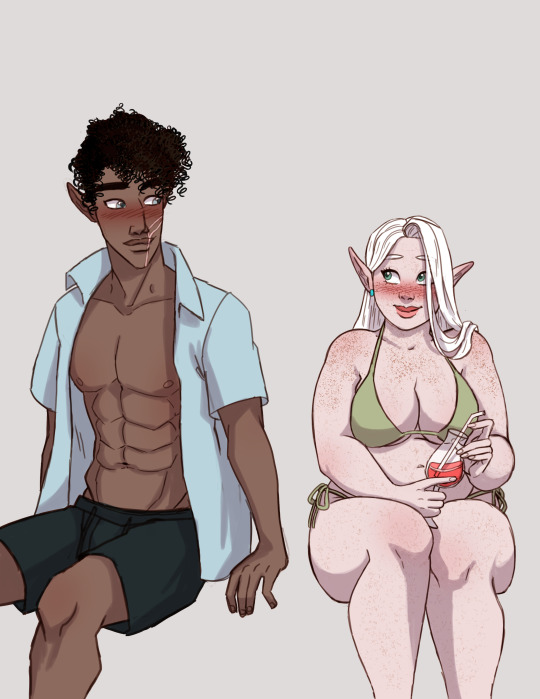
what if they met at a pool party tho 👀💦
#celrond#elrond x celebrian#lotr#lord of the rings#the silmarillion#silm fanart#lotr fanart#tolkien fanart#modern tolkien#modern lotr#my art#elrond half elven#elrond peredhel#celebrian#I know it's October but it's HOT out today (ugh) and I had to put aircon on again (wth) so that's my excuse for using my#shoddy anatomy skills to make a more summer themed artsy thing XD
252 notes
·
View notes
Text


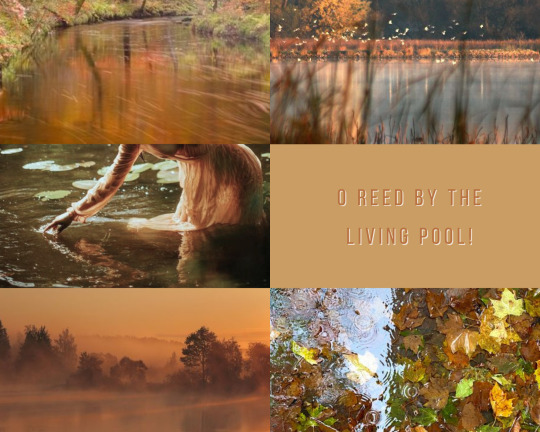

O spring-time and summer-time, and spring again after!
"Goldberry represents the actual seasonal changes in [riverlands]"
- The Letters of J.R.R. Tolkien, Letter 210
#tolkienedit#lotredit#lotrladiessource#tolkiensource#lotr#lord of the rings#tolkien#usersari#userlyndeth#usertilions#usersansa#userhaleths#it's so fun making goldberry-themed edits#because it lets me look at so many pretty river pictures#and i loved the idea of her being connected to seasons changing
96 notes
·
View notes
Text
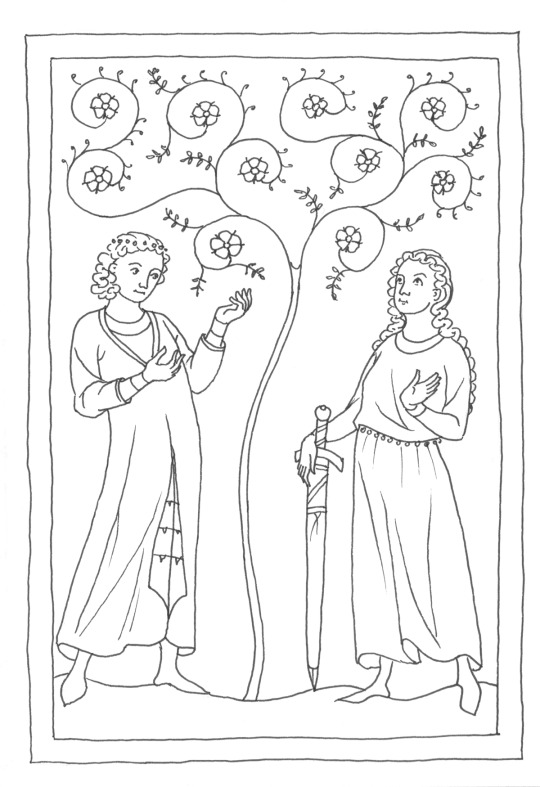
Caranthir and Haleth for @feanorianweek
#tolkien#caranthir#haleth#feanorianweek#codex manesse style#theme weeks keep me drawing#this one was fun#haleth is the one on the right#if jirt mentions an interaction between a man and a woman and it's not romantic that's something to be celebrated
95 notes
·
View notes
Text

Ask me about my not-yet-written-fics from this list
thanks, @eowyn7023 also tagging: @polutrope because you sent me an ask about this a while ago and I just haven't had the spoons to respond until now, sorry! <3
Elrond in Valinor + Second Flight of the Noldor
so this stems from three possibly spicy Opinions I have about LOTR: 1) The Valar kind of suck, actually, and it was wrong of them to bring Elves to Valinor in the first place and it went directly against Eru's plan. 2) Valinor is kind of liminal and bad for you if you were born in Middle Earth 3) Elrond sailing (and staying) in Valinor is makes very little sense for him as a character, and is more about Jirt's wish fulfillment than it is good writing.
Obviously, unfortunately, due to the narrative, Elrond must sail at the end of LOTR. He needs to recuperate from the absolute havoc Vilya wreaked on his system, and he also needs to reunite with Cel and get some closure about a few things, like Celebrimbor's death, Gil-Galad's death, and his relationship with Elwing.
So Elrond sails, as he does. He reunites with Celebrian. He spends some time meeting his various family members and spends quite a lot of time with Gil-Galad and Celebrimbor. He has exactly one (1) talk with Elwing to ask her some questions and explain what became of Elros, but in my head he is not really interested in pursuing much of a relationship with her. Elwing respects that.
He and Celebrian work on healing their relationship and re-establishing intimacy.
Elrond slowly recovers from the damage Vilya did to him.
He might need to spend some time in Lorien actually. He is very good friends with Este and Nienna.
After a while though, things just don't feel right. Valinor feels very static and strange to him, and he doesn't really feel like he Fits. And that hurts because everyone is so glad to have him there and they expect that he's just as glad to be here as they are.
Also he really misses his kids, and wonders about his grandkids, and the Dunedain.
Eventually he starts connecting with more and more people who feel like they don't Fit. Mostly Noldor and the few Sindar that sailed. Many of them are still dealing with PTSD from Middle Earth and Beleriand, or with scars that refuse to heal. Many of them are just Restless. Most Vanyar do not understand this, and it's hard to talk about.
He and Cel begin work on a second Rivendell, and this keeps them both busy for a short time. He still doesn't feel Right though.
Eventually he starts experiencing like a reverse sea-longing and it gets more, and more, and more painful.
Finally, he talks it over with Celebrian. And they petition the Valar, who are not very happy to be petitioned. And then Elrond starts preparing to sail East.
Listen listen listen. Everything that Elrond has ever built, worked for, or loved is back in Middle Earth. It makes zero sense for him to be happy in Valinor. He aligns overwhelmingly with the Sindar and with the Dunedain in the books, and the Dunedain also consider him as one of them. Rivendell is there (he left it in the care of the Dunedain). Arwen and Aragorn are there. Gondor, and what is left of Elros are there. His grandchildren are there. Elladan and Elrohir are still there. The people left for him in Valinor are all people he has already mourned and found closure with.
He's not really made for Valinor anyway. He's made to watch over Middle Earth, to keep its lore and secrets, and to caretake Elros' line. He made a vow, once, and sure Aragorn and his descendants are doing just fine but he still feels half-whole without them.
And he's not the only person who doesn't feel Right in Valinor, who miss the mold and the rot and the fungi and the sheer diversity of life, and the Men!!! The humans!!! The normalcy of pain and suffering and scars and disabilities!
And so Elrond sails with Celebrian, and many of the Noldor say 'fuck it' and they go with him. They're tired and restless and have misgivings about the Valar anyway. A remnant returns to Middle Earth, and this time they go for love.
Elrond retakes his seat in Rivendell and the Dunedain rejoice that the eldest of their race, their most beloved uncle has come home. Celebrian reunites with Arwen, and meets a long line of adopted children that she never got to see, and meets Aragorn and her grandchildren.
They live through the ages, quietly doing what they have always done: living as watchers and caretakers, carefully preserving memories and lore and history.
Rivendell becomes a place that is both mythologized and startlingly real, where it is rumored that anyone who needs it will find help and sanctuary.
Many of the Noldor live in Rivendell, but some set up their own small kingdoms or simply live alongside the men and dwarves. They're finally there to guide and watch over the Secondborn, just as was intended in the Theme.
Eventually, of course, Elrond must grieve Arwen and Aragorn, but he's there for his grandchildren, and his great grandchildren, and his great grandchildren, and all of his family thereafter -- and in Arwen and Aragorn and their line, it almost feels like he is reunited with Elros again.
Elrond is there to help.
#<3#listen i know part of Tolkien's Themes are magic leaving the world etc etc. but I don't like it#and especially for Elrond as a character it makes very little sense#elrond#celebrian#lotr#i do like other people's interpretations of Elrond in Valinor and I enjoy Elrond in Valinor fics!#but this is the one in my head that works best for me and how I see him
54 notes
·
View notes
Text
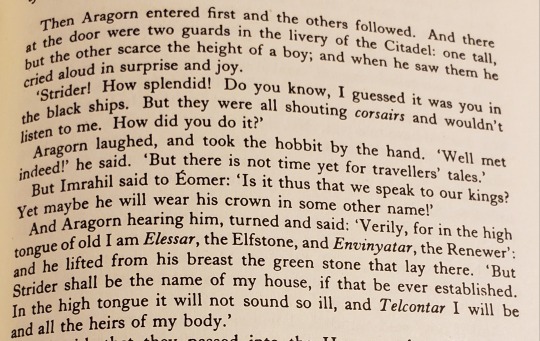
Éomer and Imrahil: *fail to recognize Aragorn in a disguise*
Pippin: Oh, hey, Strider!!
[weeping] I just love them all so much
#lotr lent#my aragorn + the hobbits feelings continue to be a theme in this reread#tolkien reading day#lotr
59 notes
·
View notes
Text

Some starry elf doodles, featuring Glorfindel, Elrond, Arwen, and Glorfindel (again)
#these were born out of the desire to try something different with my sketching process - both in color and brush#then i thought they looked vaguely star ish on the blue and committed to the theme#lord of the rings#lotr#silmarillion#Glorfindel#Glorfindel of the Golden Flower#Elrond#Elrond Peredhel#Arwen Undomiel#lotr arwen#Tolkien#Radj Draws#Radj Doodles
99 notes
·
View notes
Text
Inklings Challenge 2023: The Last Immortal of Evitra
'Tis the deadline day for the Inklings Challenge (@inklings-challenge), and I have not finished my story, but today is also Ren Faire day, and I will therefore not be able to finish today . . . but it's a long story that I'll have to post in multiple parts anyway, so have part one now, and I'll post the rest over the next week.
Also, in classic Taleweaver fashion, this is a fairy tale retelling. Which fairy tale should be fairly obvious. It is not, however, a romance.
Unedited; please be nice about typos.
~~~~~
The Last Immortal of Evitra, Part 1
Anatole Bérenger Judicaël Télesphore Corentin, lord of Blackrose Manor, last immortal of Evitra, woke to the sound of a child crying.
He let out a quiet growl as he reoriented himself to his surroundings. He’d dozed off in his study, it seemed. The last he remembered, the sun had been just at the top edge of the tall windows. Now it was gone, and the whole room was drenched in black shadows — though, of course, shadows had hidden nothing from him for the last four hundred years.
Anatole stirred and stretched, tracing the sound down the threads of magic that carried it. The child wasn’t within the manor house itself, thankfully, but it was concerningly close. Behind the stables, if Anatole read the magic aright. What it was doing there, he could guess, and the thought made him growl again. It had been a long, long time since small boys dared their friends to creep up to his home and spend ten minutes within his gates. If the practice was starting up again . . . well. It might require him to go down to the town again for the first time in decades.
Unless, of course, he could put a stop to it now. Anatole took his cloak from its hook by the door and swept it around his shoulders. Then he stalked from his study, through the halls to a side door, and out into the night.
By the time he found the child, it had stopped crying and moved inside the stables. There were no horses there anymore, nor even any hay — Anatole had no need for such things these days. But in the back, in a corner of the very last stall, there was a small boy, curled up and shivering with his eyes shut and hands balled into the ragged sleeves of his much-mended shirt.
Anatole stepped into the stall, making sure to leave space in the doorway, and growled again, low and menacing. “Boy. Leave my home or face the consequences.”
The boy startled, and his eyes flew open. Anatole knew well what the boy saw. His cursed form was a work of art, he had to admit — curving horns and red eyes and sharp fangs and claws all sharp and distinct and gleaming even without light, and the rest of him a hulking beast of shadows with just enough substance to resolve into one’s worst nightmares. It was a form to make the bravest of men turn and run.
But rather than fleeing, the boy pressed himself more firmly into his corner. “No. I’m not scared of you, demon.” His voice strongly suggested otherwise. “Oúte o thánatos, oúte i zoí, oúte ángeloi, oúte igemoníes, oúte oi dynámas —”
“Oúte oi dynámeis,” Anatole snapped. “If you’re going to threaten demons with the Holy Writ, boy, you’d better say it correctly. Fortunately for you, I am not a demon. But I am a monster.” He bared his teeth further and growled again. “Now, begone. Go home.”
“Don’t have a home.” The boy’s hands scrabbled on the floor as if searching for a crack or crevice to hold onto. “You’ve got the whole house and all the land. You can spare a corner for the night.”
“If you have no home, then get yourself to the orphanage. I understand that’s what it’s there for.” Anatole pointed out the door. “Go.”
“Won’t.” The boy, finding no handholds, crossed his arms and shut his eyes. “Go away, monster. You’re probably a bad dream anyway.”
How dare the boy defy him! How dare he!
Anatole felt the enchantments woven into every inch of the estate swell in response to his wrath. They didn’t anticipate his need the way they once would have — the curse ensured that — but they would answer swift enough if he called upon them. He could have this boy ejected and back on the road in moments, and in the morning he could add another layer of spellwork to more effectively discourage trespassers.
But it was full night, the town was well over a mile away, and there were wolves in these woods. Sending the boy out on his own would be a shade too close to outright murder for Anatole’s taste. So, with a sigh, he reached down, grabbed the boy, and slung him over his shoulder. Then he turned and trudged back towards the main house.
The boy thrashed and struggled to get free. “Let me go! Put me down, monster!”
“No.” Anatole shoved open the side door, stepped through, and then paused to lock it behind them. “If you’re spending the night on my estate, you’ll do it where I can keep an eye on you.”
The boy continued to wriggle and protest as Anatole made his way swiftly to one of the smaller guest chambers. There, with much relief, he dropped the boy onto the couch. No dust rose — cleaning spells were child’s play, and Anatole had spent his first week of isolation laying multiple in every room. But somehow, the cushions still managed to let off an air of long disuse.
Anatole took a step back. “You’ll sleep here and then leave in the morning.” Now that he’d brought the boy inside, the long-practiced rules of hospitality gripped him like an instinct. “Are you hungry?”
The boy eyed him with suspicion, but gave a tight little nod. Anatole shut his eyes, probing his awareness of the house to check what he had to offer. Apples, cold turkey left from his dinner, cheese — that would do. A few commands and a plate appeared on the low table beside the couch, along with a sturdy mug of water. Anatole opened his eyes again. “Eat.”
The boy poked at the apple suspiciously — rude of him, as Anatole had even gone to the trouble of having it sliced. “Is this fairy food?”
“I have no interest in trapping you in my home.” Anatole resisted the urge to roll his eyes. “I summoned it by magic, but the food is real.”
The boy picked up an apple slice, tasted it, and seemed to approve. “Are you planning to eat me?”
“There’s not enough meat on your bones to be worth the effort.” Anatole turned. “Eat, sleep, and be gone in the morning. I will come to this room at ten o’clock, and if you are not gone, I will remove you myself — and should you return, I may rethink eating you.” He waited to hear no further protests, but rather stalked out of the room, shutting the door behind him. As an afterthought, he locked it, laying a small spell so it would unlock again only after the boy had slept, and sent a command through the estate to close and lock all other doors and to only let them open at his own touch, or if they were necessary to let the boy out in the morning. With that, he made his way to his own bed and fell into a light slumber.
At half-past seven the next morning, he roused as he sensed the boy scurrying out the same side door they’d entered through the night before. Anatole remained awake until he felt the boy vanish off the edge of the estate. Then, satisfied, he drifted back into deeper sleep. He had done his duty; no one could argue that. And now the boy was gone and, with any luck, the threat of being eaten would be enough to keep others away for another hundred years or so.
~~~
Three days passed peacefully, and the fourth dawned cold, grey, and threatening either rain or snow. Anatole had decided some centuries ago that, on such days, resisting the urge to hibernate like the bear he somewhat resembled was far more trouble than it was worth. So, he spent most of the day in the library, alternately napping and listening as a speaker-spell read a book to him, stirring only when hunger made it necessary to summon a meal.
He was just waking from one of these naps when he felt a clumsy tug on the estate’s magic. Immediately, he shook himself, reaching out to see who or what dared try to use his power.
Once again, there was a child at the other end of the disturbance. The same one as before, if Anatole wasn’t mistaken. And there was another with him, smaller than he. Anatole growled, extracting himself from his blankets. Apparently, he’d been too kind to the boy last time. He would not make the same mistake again.
Outside, the sky had resolved into a storm of wind and driving rain and occasional flashes of lightning. Anatole trudged onward all the same, following the periodic tugs in his web of enchantment. A curse and a pox on the boy for choosing this day of all days to come back! And he was further from the main house this time, all the way out in the gamekeeper’s cottage — even longer disused than the rest of the estate’s outbuildings.
The door was locked, but it opened at his touch. The floorboards creaked beneath his feet as he swept inside, drawing himself up to his full height so he nearly touched the ceiling. “I told you not to return.”
The boy — indeed the same one as last time — looked up with wide eyes. He scrambled to his feet, darting in front of the other child. “What d’you care? You’ve got all this space and no one to live in it. We’re not hurting anything. I didn’t come anywhere near your house this time.”
“I care very much when someone trespasses on my property and tries to use my power for his own.” Anatole peered past the boy at the second child: a little girl, perhaps half the boy’s age, yellow-haired and thin-cheeked. “And you should know better than to wander into a monster’s den.”
“There’s monsters everywhere. You aren’t special.” The boy glanced behind him, and his shoulders sagged a little. “One night, Seigneur, please. Then we’ll leave. I promise. We’ll leave and we won’t come back.”
Anatole considered — but the rain and wind outside left him no choice. “I will hold you to that promise.” He turned. “Come.”
The two followed, straggling along behind him, the boy carrying a small bundle on his shoulder and helping the girl along with his free hand. However, after ten minutes, in which Anatole had to stop and wait five separate times for the children to catch up, he turned and simply scooped up both, ignoring their panicked protests. They were light as feathers, both of them — lighter than they ought to be, but perhaps that was merely the greater strength of his current form. Or perhaps he was misremembering. It had been many, many centuries since he’d had reason to carry a child.
He didn’t set the two back down until he’d reached the small guest room where he’d let the boy stay last time. There, he deposited both children onto the couch and once again summoned a platter of food: two bowls of the thick rabbit stew he’d started earlier that day for his dinner, cold flatbread rounds left from lunch, soft cheese, and juicy pears. This time, he very deliberately chose to materialize it on the table by the fireplace. “The food will stay warm until you eat it, at which point you will take care not to make a mess. You will remain in this room, the adjoining one, or the connected bathing chamber until after dawn tomorrow, and you will leave no later than ten o’clock. At no point will you disturb me. Is this understood?”
The girl just stared, but the boy nodded. “I understand. We’ll do as you say.”
“Good.” Anatole stalked from the room — but, to his surprise, the boy followed him out. “What did I say to you a moment ago?”
“I need to ask you something, sir.” The boy held his head up, dropping his tone. “If you eat one of us, make it me. Not Aimée. I’m the one who brought her here. And can you make sure she goes somewhere aside from the orphanage when you send her away?”
Anatole cast a cold glance at the boy. “The two of you together wouldn’t make as much meat as the rabbit I put in tonight’s stew. You may attend to the girl’s fate yourself when you both leave in the morning.”
“Thank you, Seigneur.” There was a bitter note in the boy’s voice, no doubt at the fact that he had to express gratitude for not being eaten. “We’ll not disturb you.”
He disappeared back into the room, and Anatole strode hastily away, working a belated drying-spell to pull the water from his cloak, clothes, and form. One night more. Then these two would be out of his hair and, with any luck, far, far away.
#story: unfinished#inklingschallenge#inklings challenge#team tolkien#genre: secondary world#(couldn't figure out how to work in both this time)#theme: food#theme: shelter#I actually have more written#but this is the cleanest break#and I want to leave myself a buffer
95 notes
·
View notes
Text
I need everyone to know that if your Glorfindel of the Golden Flower is not wearing his golden hair in basic-Instagram-bitch flower braids I don’t know what you are doing with your life.
For everyday:

For parties:

For court (pretend it’s blond):

For WAR (Pre-Balrog):

For WAR (post Balrog):


Textured version (again, pretend it’s blond. Or don’t. But I am):

(I found it hard to find similarly cheesy flowery braid hairstyles for non-straightened textured hair, but please accept this impractical elven alternative the aesthetic Flower Afro/Flower Crown)

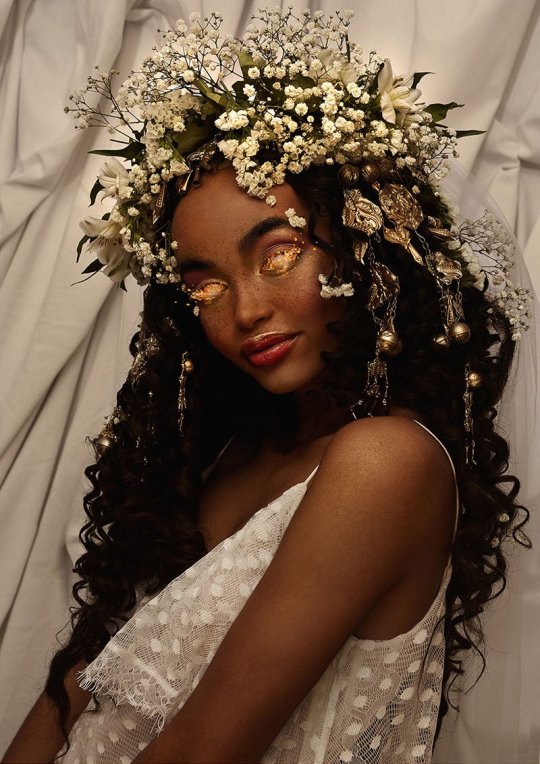

tl.dr: Extremely Flowery hairstyles only for my Balrog-slaying boy.
#glorfindel#Glorfindel of the golden flower#tolkien#the silmarillion#lotr#jirt#silm#Silm shitpost#look sometimes you just see an extremely complicated aesthetic hairstyle and go#‘yeah my fantasy blorbo is committed enough to his house’s theme to wear that every day’
644 notes
·
View notes
Text

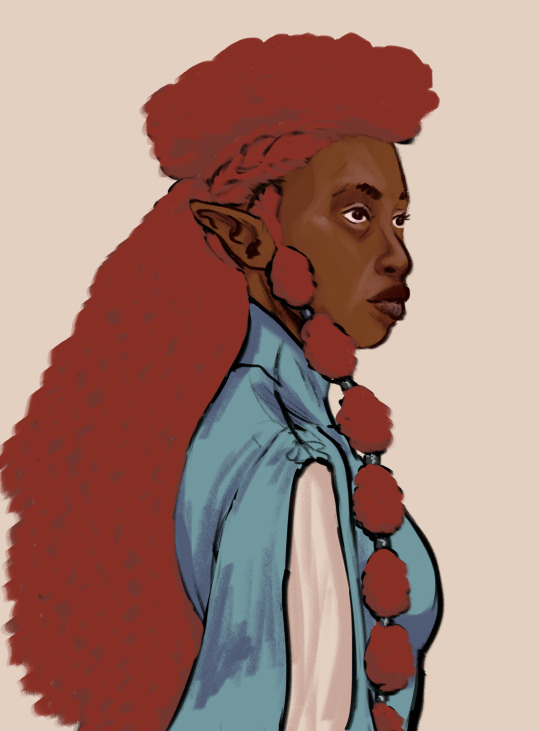

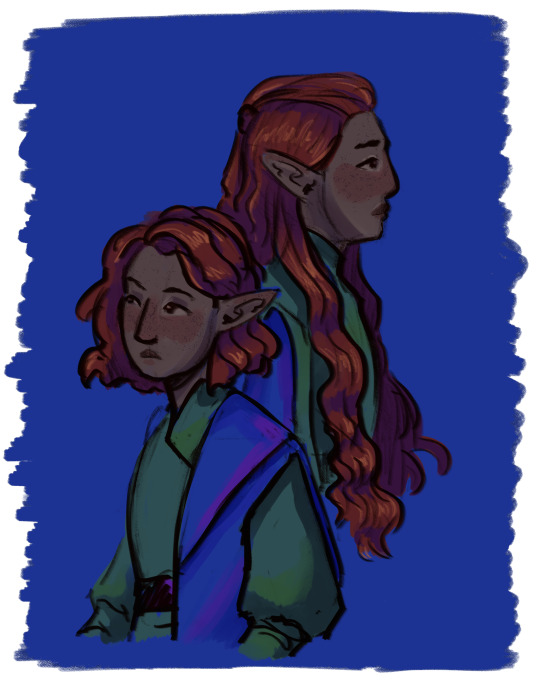

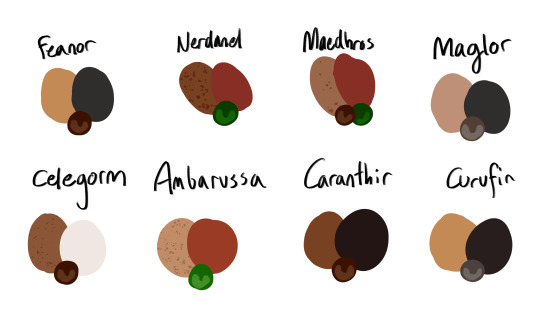
feanorian sketches: feanor, nerdanel, maedhros (drawn before i updated his design), ambarussa, nerdanel and baby nelyo, bonus quick color palettes
#the unintentional color theme of this post is RED#feanorians#silmart#the silmarillion#feanor#maedhros#nerdanel#ambarussa#tolkien#my art#you can probably tell but maedhros is my little princess <3 my war criminal <3
113 notes
·
View notes
Text

of him the harpers sadly sing
#silm#silmarillion#gil galad#ereinion#i will never understand why amazon made him gold themed#like he has silver hair. silver shield. his heraldry is blue and silver.#im no tolkien scholar but i dont think his theme color is gold...
205 notes
·
View notes
Text

quick lil Modern Arwen doodle... she's the captain of the softball team
😍
#arwen undomiel#lotr#lord of the rings#tolkien fanart#lotr fanart#silmarillion#silm fanart#the silmarillion#tolkien art#my art#modern tolkien#idk why i decided to make this doodle softball themed LOL i just got it in my head that modern Arwen plays softball#I wanted her to be thicc but sporty haha
125 notes
·
View notes